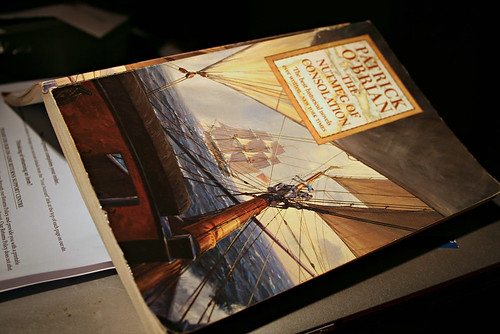We need a break, my love and I. (No, not the husband. We, in fact, have had an involuntary break of a couple of days and it was horrible, so no more breaks there, please.) My other love, my first love, really: Fiction. We’re in a rut, s funk, the dumps. Peevishly glaring at each other. Finding faults. Niggling. It’s not pretty.
I don’t know what it is, precicely, but I can’t seem to find a novel I’m happy with these days. Ok, so it’s only a few weeks since I finished The Unbearable Lightness of Scones, and that was indubitably a wonderful experience and a book worth climbing mountains and fording rivers for (should such things be necessary), however, that is the only piece of fiction (unless you count what’s in the newspapers, which, possibly, you should) I’ve finished since August, and it’s getting me down. I tried reading Are Kalvø’s Nød and almost threw it across the bus. I tried Jan Kjærstad’s Kongen av Europa and considered writing to Jasper Fforde to ask if he could send a hired killer for the main character (or possibly the author, but that wouldn’t stop the book, so why bother?). I started Cornelia Funke’s The Thief Lord and put it away almost immediately because I really do want to read it so I didn’t want to get far enough to get mad at it. I’ve looked at the books in my tbr pile (the physical one) and I can’t find a single one that says “read me now!”. I’m in that mood where I crave a good nove, but every novel I try seems contrived and petty and full of silly mistakes that the editors should really have exterminated. I’m reading Anne McCaffrey’s Freedom’s Landing and I ought to love it but she used “specimen” twice when I’m pretty sure she means “species” and I get impatient with her for creating minor characters that are petty, ignorant, prejudiced and blatant fools, when all she is trying to do is portray human foibles.
What is a girl to do?
Well, I’ll finish Freedom’s Landing, and then I’ll take a nice long break from Fiction. I’ll see other genres, and I’m pretty sure he’ll see other people, and then in a few months we’ll fall in love all over again. I hope. Facing a future without Fiction is too bleak a scenario to contemplate.
